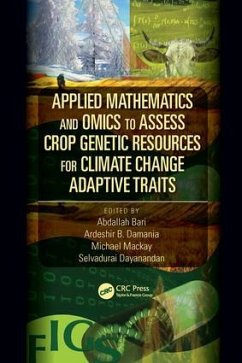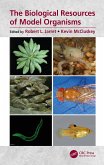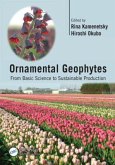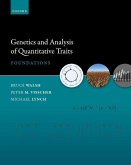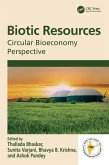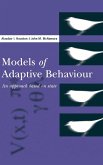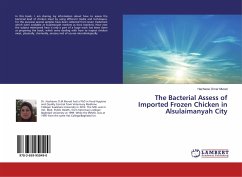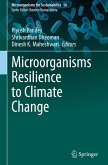Applied Mathematics and Omics to Assess Crop Genetic Resources for Climate Change Adaptive Traits
Herausgeber: Bari, Abdallah; Dayanandan, Selvadurai; Mackay, Michael; Damania, Ardeshir B
Applied Mathematics and Omics to Assess Crop Genetic Resources for Climate Change Adaptive Traits
Herausgeber: Bari, Abdallah; Dayanandan, Selvadurai; Mackay, Michael; Damania, Ardeshir B
- Gebundenes Buch
- Merkliste
- Auf die Merkliste
- Bewerten Bewerten
- Teilen
- Produkt teilen
- Produkterinnerung
- Produkterinnerung
This book focuses on using genetic resources to mitigate the effects of climate change and improve crop production. It emphasizes recent advances in mathematics and omics technologies while addressing issues related to the adaptation of crops to changing and fluctuating climatic conditions. With contributions from leading scientists and practitioners, it presents a broad view of the interplay of biodiversity in agriculture, discusses answers to some of the latest problems, and highlights ways to provide useful information to those who are working to address the effects of global warming and climate change.…mehr
Andere Kunden interessierten sich auch für
![The Biological Resources of Model Organisms The Biological Resources of Model Organisms]() The Biological Resources of Model Organisms213,99 €
The Biological Resources of Model Organisms213,99 €![Ornamental Geophytes Ornamental Geophytes]() Ornamental Geophytes281,99 €
Ornamental Geophytes281,99 €![Genetics and Analysis of Quantitative Traits Genetics and Analysis of Quantitative Traits]() Genetics and Analysis of Quantitative Traits174,99 €
Genetics and Analysis of Quantitative Traits174,99 €![Biotic Resources Biotic Resources]() Biotic Resources176,99 €
Biotic Resources176,99 €![Models of Adaptive Behaviour Models of Adaptive Behaviour]() Alasdair I. HoustonModels of Adaptive Behaviour160,99 €
Alasdair I. HoustonModels of Adaptive Behaviour160,99 €![The Bacterial Assess of Imported Frozen Chicken in Alsulaimanyah City The Bacterial Assess of Imported Frozen Chicken in Alsulaimanyah City]() Hazhaow Omer MuradThe Bacterial Assess of Imported Frozen Chicken in Alsulaimanyah City16,99 €
Hazhaow Omer MuradThe Bacterial Assess of Imported Frozen Chicken in Alsulaimanyah City16,99 €![Microorganisms Resilience to Climate Change Microorganisms Resilience to Climate Change]() Microorganisms Resilience to Climate Change151,99 €
Microorganisms Resilience to Climate Change151,99 €-
-
-
This book focuses on using genetic resources to mitigate the effects of climate change and improve crop production. It emphasizes recent advances in mathematics and omics technologies while addressing issues related to the adaptation of crops to changing and fluctuating climatic conditions. With contributions from leading scientists and practitioners, it presents a broad view of the interplay of biodiversity in agriculture, discusses answers to some of the latest problems, and highlights ways to provide useful information to those who are working to address the effects of global warming and climate change.
Produktdetails
- Produktdetails
- Verlag: CRC Press
- Seitenzahl: 284
- Erscheinungstermin: 19. Februar 2016
- Englisch
- Abmessung: 234mm x 157mm x 23mm
- Gewicht: 567g
- ISBN-13: 9781498730136
- ISBN-10: 1498730132
- Artikelnr.: 43545401
- Herstellerkennzeichnung
- Libri GmbH
- Europaallee 1
- 36244 Bad Hersfeld
- gpsr@libri.de
- Verlag: CRC Press
- Seitenzahl: 284
- Erscheinungstermin: 19. Februar 2016
- Englisch
- Abmessung: 234mm x 157mm x 23mm
- Gewicht: 567g
- ISBN-13: 9781498730136
- ISBN-10: 1498730132
- Artikelnr.: 43545401
- Herstellerkennzeichnung
- Libri GmbH
- Europaallee 1
- 36244 Bad Hersfeld
- gpsr@libri.de
Abdallah Bari is a researcher focusing on applied mathematics in agricultural research. He received his PhD in imaging techniques to assess genetic variation for water-use efficiency from the University of Cordoba, Spain. His research involves elaborating and applying mathematical models and theoretical aspects to seek practical solutions, such as the application of fractal geometry to capture complex trait variation in plants. He has published peer-reviewed articles and chapters and has edited a book on the assessment of genetic resources for water-use efficiency. He collaborates with researchers from universities, research institutions, and development organizations to explore new frontiers of applied mathematics in agricultural research to address climate change issues. Ardeshir B. Damania is an associate in the Agricultural Experimental Station (AES) at the University of California, Davis. He received his PhD in crop plant genetic resources from the University of Birmingham, United Kingdom. His current research interests include climate change, biodiversity conservation, origins of agriculture, crop domestication, and plants of economic and medicinal values. He has edited a number of books, including Biodiversity and Wheat Improvement, which has been translated into Chinese. He has authored numerous papers in refereed international journals and articles in the popular press on wheat improvement, conservation of genetic resources, and Asian agricultural history. Michael Mackay is an honorary associate professor at the Queensland Alliance for Agriculture and Food Innovation, an institute based at the University of Queensland, St. Lucia in Brisbane, Australia. He received his PhD from the Swedish University of Agricultural Sciences. His main research interest is in how pre-breeders and breeders actually go about identifying and using plant genetic resources. This research eventually led to the development of a different approach known as Focused Identification of Germplasm Strategy (FIGS) in a collaborative Grains Research and Development Corporation project between ICARDA, the AWCC, and the N. I. Vavilov Research Institute of Plant Industry in St. Petersburg, Russia. He has published more than 40 articles, including book chapters, refereed scientific papers, and conference proceedings. Selvadurai Dayanandan is a professor and graduate program director in the biology department of Concordia University, Montreal, Canada. He received his PhD in biology from Boston University. He was director of the graduate diploma program in biotechnology and genomics at Concordia University as well as an Izaak W. Killam postdoctoral fellow at the University of Alberta. His current research focuses on understanding the origin and maintenance of biodiversity in forest and agricultural landscapes using genomics technologies. He has published extensively in the field of biodiversity conservation, ranging from socioeconomic factors and tropical deforestation through the population, conservation, and evolutionary genomics of forest trees and crop plants.
CLIMATE-CHANGE IMPLICATIONS FOR DRYLANDS AND FARMING COMMUNITIES. Climate
Change and Dryland Systems. Plant Genetic Resources and Climate Change:
Stakeholder Perspectives from the Nordic and Arctic Regions. Adaptation of
Farmers to Climate Change: A Systems Approach to Cereal Production in
Benslimane Region, Morocco. Assessment of the Demand-Supply Match for
Agricultural Innovations in Africa. POTENTIAL OF USING GENETIC RESOURCES
AND BIODIVERSITY TO ADAPT TO AND MITIGATE CLIMATE CHANGE. Exploitation of
Genetic Resources to Sustain Agriculture in the Face of Climate Change with
Special Reference to Wheat. Utilizing the Diversity of Wild Soybeans in
China for Accelerating Soybean Breeding in the Genome Era. Adaptation of
Potato (Solanum tuberosum) and Tomato (S. lycopersicum) to Climate Change.
Barley Genetic Resources for Climate-Change Adaptation: Searching for
Heat-Tolerant Traits through Rapid Evaluation of Subsets. Fruit Genetic
Resources Facing Increasing Climate Uncertainty. APPLIED MATHEMATICS
(UNLOCKING THE POTENTIAL OF MATHEMATICAL CONCEPTUAL FRAMEWORKS). Applied
Mathematics in Genetic Resources: Toward a Synergistic Approach Combining
Innovations with Theoretical Aspects. Power Transformations: Application
for Symmetrizing the Distribution of Sample Coefficient of Variation from
Inverse Gaussian Populations. Toward More Effective Discovery and
Deployment of Novel Plant Genetic Variation: Reflection and Future
Directions. Identifying Climate Patterns during the Crop-Growing Cycle from
30 Years of CIMMYT Elite Spring Wheat International Yield Trials. Assessing
Plant Genetic Resources for Climate-Change Adaptive Traits: Heat Traits.
Plant Genetic Diversity: Statistical Methods for Analyzing Distribution and
Diversity of Species. APPLIED OMICS TECHNOLOGIES. Exploiting Germplasm
Resources for Climate-Change Adaptation in Faba Bean. Developing
Climate-Change Adaptive Crops to Sustain Agriculture in Dryland Systems
through Applied Mathematics and Genomics. Toward the Rapid Domestication of
Perennial Grains: Developing Genetic and Genomic Resources for Intermediate
Wheatgrass. Traits for Testing, Screening, and Improving Salt Tolerance of
Durum Wheat Genetic Resources. Gene Flow as a Source of Adaptation of Durum
Wheat to Changing Conditions Including Climate Change: Double Gradient
Selection Technique. Addressing Diversity of Ethiopian Durum Wheat Landrace
Populations Using Microsatellite Markers.
Change and Dryland Systems. Plant Genetic Resources and Climate Change:
Stakeholder Perspectives from the Nordic and Arctic Regions. Adaptation of
Farmers to Climate Change: A Systems Approach to Cereal Production in
Benslimane Region, Morocco. Assessment of the Demand-Supply Match for
Agricultural Innovations in Africa. POTENTIAL OF USING GENETIC RESOURCES
AND BIODIVERSITY TO ADAPT TO AND MITIGATE CLIMATE CHANGE. Exploitation of
Genetic Resources to Sustain Agriculture in the Face of Climate Change with
Special Reference to Wheat. Utilizing the Diversity of Wild Soybeans in
China for Accelerating Soybean Breeding in the Genome Era. Adaptation of
Potato (Solanum tuberosum) and Tomato (S. lycopersicum) to Climate Change.
Barley Genetic Resources for Climate-Change Adaptation: Searching for
Heat-Tolerant Traits through Rapid Evaluation of Subsets. Fruit Genetic
Resources Facing Increasing Climate Uncertainty. APPLIED MATHEMATICS
(UNLOCKING THE POTENTIAL OF MATHEMATICAL CONCEPTUAL FRAMEWORKS). Applied
Mathematics in Genetic Resources: Toward a Synergistic Approach Combining
Innovations with Theoretical Aspects. Power Transformations: Application
for Symmetrizing the Distribution of Sample Coefficient of Variation from
Inverse Gaussian Populations. Toward More Effective Discovery and
Deployment of Novel Plant Genetic Variation: Reflection and Future
Directions. Identifying Climate Patterns during the Crop-Growing Cycle from
30 Years of CIMMYT Elite Spring Wheat International Yield Trials. Assessing
Plant Genetic Resources for Climate-Change Adaptive Traits: Heat Traits.
Plant Genetic Diversity: Statistical Methods for Analyzing Distribution and
Diversity of Species. APPLIED OMICS TECHNOLOGIES. Exploiting Germplasm
Resources for Climate-Change Adaptation in Faba Bean. Developing
Climate-Change Adaptive Crops to Sustain Agriculture in Dryland Systems
through Applied Mathematics and Genomics. Toward the Rapid Domestication of
Perennial Grains: Developing Genetic and Genomic Resources for Intermediate
Wheatgrass. Traits for Testing, Screening, and Improving Salt Tolerance of
Durum Wheat Genetic Resources. Gene Flow as a Source of Adaptation of Durum
Wheat to Changing Conditions Including Climate Change: Double Gradient
Selection Technique. Addressing Diversity of Ethiopian Durum Wheat Landrace
Populations Using Microsatellite Markers.
CLIMATE-CHANGE IMPLICATIONS FOR DRYLANDS AND FARMING COMMUNITIES. Climate
Change and Dryland Systems. Plant Genetic Resources and Climate Change:
Stakeholder Perspectives from the Nordic and Arctic Regions. Adaptation of
Farmers to Climate Change: A Systems Approach to Cereal Production in
Benslimane Region, Morocco. Assessment of the Demand-Supply Match for
Agricultural Innovations in Africa. POTENTIAL OF USING GENETIC RESOURCES
AND BIODIVERSITY TO ADAPT TO AND MITIGATE CLIMATE CHANGE. Exploitation of
Genetic Resources to Sustain Agriculture in the Face of Climate Change with
Special Reference to Wheat. Utilizing the Diversity of Wild Soybeans in
China for Accelerating Soybean Breeding in the Genome Era. Adaptation of
Potato (Solanum tuberosum) and Tomato (S. lycopersicum) to Climate Change.
Barley Genetic Resources for Climate-Change Adaptation: Searching for
Heat-Tolerant Traits through Rapid Evaluation of Subsets. Fruit Genetic
Resources Facing Increasing Climate Uncertainty. APPLIED MATHEMATICS
(UNLOCKING THE POTENTIAL OF MATHEMATICAL CONCEPTUAL FRAMEWORKS). Applied
Mathematics in Genetic Resources: Toward a Synergistic Approach Combining
Innovations with Theoretical Aspects. Power Transformations: Application
for Symmetrizing the Distribution of Sample Coefficient of Variation from
Inverse Gaussian Populations. Toward More Effective Discovery and
Deployment of Novel Plant Genetic Variation: Reflection and Future
Directions. Identifying Climate Patterns during the Crop-Growing Cycle from
30 Years of CIMMYT Elite Spring Wheat International Yield Trials. Assessing
Plant Genetic Resources for Climate-Change Adaptive Traits: Heat Traits.
Plant Genetic Diversity: Statistical Methods for Analyzing Distribution and
Diversity of Species. APPLIED OMICS TECHNOLOGIES. Exploiting Germplasm
Resources for Climate-Change Adaptation in Faba Bean. Developing
Climate-Change Adaptive Crops to Sustain Agriculture in Dryland Systems
through Applied Mathematics and Genomics. Toward the Rapid Domestication of
Perennial Grains: Developing Genetic and Genomic Resources for Intermediate
Wheatgrass. Traits for Testing, Screening, and Improving Salt Tolerance of
Durum Wheat Genetic Resources. Gene Flow as a Source of Adaptation of Durum
Wheat to Changing Conditions Including Climate Change: Double Gradient
Selection Technique. Addressing Diversity of Ethiopian Durum Wheat Landrace
Populations Using Microsatellite Markers.
Change and Dryland Systems. Plant Genetic Resources and Climate Change:
Stakeholder Perspectives from the Nordic and Arctic Regions. Adaptation of
Farmers to Climate Change: A Systems Approach to Cereal Production in
Benslimane Region, Morocco. Assessment of the Demand-Supply Match for
Agricultural Innovations in Africa. POTENTIAL OF USING GENETIC RESOURCES
AND BIODIVERSITY TO ADAPT TO AND MITIGATE CLIMATE CHANGE. Exploitation of
Genetic Resources to Sustain Agriculture in the Face of Climate Change with
Special Reference to Wheat. Utilizing the Diversity of Wild Soybeans in
China for Accelerating Soybean Breeding in the Genome Era. Adaptation of
Potato (Solanum tuberosum) and Tomato (S. lycopersicum) to Climate Change.
Barley Genetic Resources for Climate-Change Adaptation: Searching for
Heat-Tolerant Traits through Rapid Evaluation of Subsets. Fruit Genetic
Resources Facing Increasing Climate Uncertainty. APPLIED MATHEMATICS
(UNLOCKING THE POTENTIAL OF MATHEMATICAL CONCEPTUAL FRAMEWORKS). Applied
Mathematics in Genetic Resources: Toward a Synergistic Approach Combining
Innovations with Theoretical Aspects. Power Transformations: Application
for Symmetrizing the Distribution of Sample Coefficient of Variation from
Inverse Gaussian Populations. Toward More Effective Discovery and
Deployment of Novel Plant Genetic Variation: Reflection and Future
Directions. Identifying Climate Patterns during the Crop-Growing Cycle from
30 Years of CIMMYT Elite Spring Wheat International Yield Trials. Assessing
Plant Genetic Resources for Climate-Change Adaptive Traits: Heat Traits.
Plant Genetic Diversity: Statistical Methods for Analyzing Distribution and
Diversity of Species. APPLIED OMICS TECHNOLOGIES. Exploiting Germplasm
Resources for Climate-Change Adaptation in Faba Bean. Developing
Climate-Change Adaptive Crops to Sustain Agriculture in Dryland Systems
through Applied Mathematics and Genomics. Toward the Rapid Domestication of
Perennial Grains: Developing Genetic and Genomic Resources for Intermediate
Wheatgrass. Traits for Testing, Screening, and Improving Salt Tolerance of
Durum Wheat Genetic Resources. Gene Flow as a Source of Adaptation of Durum
Wheat to Changing Conditions Including Climate Change: Double Gradient
Selection Technique. Addressing Diversity of Ethiopian Durum Wheat Landrace
Populations Using Microsatellite Markers.

